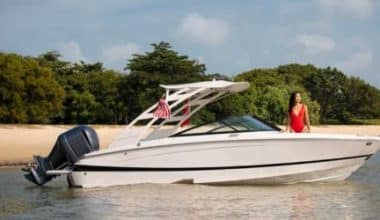The yacht insurance’s liability and property damage coverage is available for boats that are 27 feet or longer. Certain dangers, like fire, theft, vandalism, or wind, can cause damage to the boat’s hull, engine, and other associated equipment, and this coverage can apply to occurrences resulting in physical harm or damage to the property of others while the yacht is being operated. In the event of an accident, you may be able to get your yacht towed and your personal belongings insured as well. In this article, we will discuss the cost of yacht insurance, some of the best companies that provide this insurance, and how it works in Florida.
What Is Yacht Insurance?
Yacht insurance, also known as boat insurance or marine insurance, provides coverage for yachts and other watercraft. It protects boat owners from financial losses in the event of accidents, damages, theft, or liabilities arising from boating activities. Yacht insurance policies typically cover physical damage to the yacht, including the hull, sails, machinery, and equipment. They also offer liability coverage, which protects the owner if they are held responsible for injury or property damage to others while operating the yacht.
Additionally, yacht insurance can include coverage for personal belongings on the boat, towing assistance, and protection against environmental damage such as oil spills. The cost of yacht insurance varies based on factors like the yacht’s value, its age, usage, location, and the owner’s boating experience. Having yacht insurance is essential for yacht owners to enjoy peace of mind and financial security while indulging in their maritime pursuits.
How Does Yacht Insurance Work?
Yacht insurance, like auto insurance, allows you to file claims in the event of damage to your vessel or injury to a third party. If such occurrences fall under the purview of your policy, your insurer will pay for damages up to the policy’s limits and in accordance with its other terms and conditions.
In the event of a total loss to the yacht due to a covered risk and after deduction for the deductible, there are two main types of yacht insurance policies:
#1. An Agreed Value Policy
More money will be out of pocket initially, but if the yacht is ruled a total loss, the insurer will pay the agreed-upon amount. You and the insurer settle on this figure at the time of policy purchase, and it may be necessary to provide an appraisal or sales receipt as proof.
#2. An Actual Cash Value Policy
Because it factors in depreciation and current market value, a total loss settlement will only pay out what the yacht is actually worth. This policy is often cheaper, but it gives less coverage.
In addition, the two main parts of yacht insurance coverage are hull insurance and liability insurance.
Your yacht’s hull, engine(s), sails, and any other equipment necessary for its functioning will all be covered in the event of accidental physical damage or loss thanks to the hull insurance provision of your policy. Depending on the details of the insurance, personal belongings stored on the yacht may also be protected. If you need to finance your yacht, this insurance will safeguard you and the bank.
The liability clause addresses any responsibility you may have to others under the law as a result of your ownership or use of the yacht, such as for personal injury, death, or property damage.
In the event that you cause damage to another yacht, you may be compensated for costs beyond those associated with a collision. If you fail to provide the right of way to a yacht and that yacht crashes into a channel marker to avoid colliding with you, you may still be held financially responsible for the damage.
What Does Yacht Insurance Cover?
Yacht insurance provides comprehensive coverage to protect yacht owners from various risks and liabilities associated with owning and operating a yacht. Typically, the coverage includes protection against physical harm to the yacht resulting from mishaps, storms, or other perils. This includes the hull, sails, machinery, and equipment on the yacht. Yacht insurance also offers liability coverage, which is crucial in case the yacht owner is held responsible for injury or property damage to others while operating the yacht. This can cover legal expenses, medical bills, and compensation for damages.
Additionally, yacht insurance can extend coverage to personal belongings on the boat, such as clothing, electronics, and water sports equipment. Many policies also include coverage for towing assistance, ensuring the yacht owner receives help if the yacht breaks down or becomes stranded. Furthermore, environmental damage coverage protects against pollution-related liabilities, such as oil spills, which can result in significant cleanup costs.
It’s essential to note that the specific coverage and limits can vary between insurance policies and providers. Yacht owners should carefully review their insurance policy to understand the extent of their coverage and ensure it meets their individual needs and preferences on the water.
Which Coverage Is Not Included Under a Yacht Policy?
Yatch insurance does not cover the following items, to name a few:
#1. Kidnapping and Ransom
Resolving a hijacking or kidnapping for ransom is tough because of the high stakes involved (human lives and property such as ships and cargo), the criminal nature of the situation, and the complex legal backdrop. As a result, yacht insurance typically does not cover kidnapping or demands for ransom.
#2. Marine Life Encounters
Sharks, whales, and other marine animals frequently cause damage that yacht insurance does not cover. Talk to your insurance agent about getting additional coverage if you routinely sail in areas known to have sharks, stingrays, or other dangerous marine life.
#3. Hurricane Insurance
Unless otherwise stated in the contract, the yacht’s insurer may be liable for hurricane-related damage from the storm’s strong winds and hail. If you want to know if a storm will affect your insurance coverage, call the yacht’s provider.
#4. Racing
The majority of boat insurance policies specifically exclude yacht races from coverage. Imagine you want to enter races with your boat. Specifically, the prospect of additional liability insurance in the event of a mishap on the course is something you may want to discuss with your insurance agent.
#5. Insects and Mold
The majority of yacht insurance policies do not cover insects and mold. It’s crucial to take preventative measures in the event of an infestation on your ship. Therefore, after each use, you’ll need to clean, drain, and dry the tools on your yacht.
What Do You Need to Know Before Picking a Yacht Insurance Policy?
The most important factor to consider when comparing physical damage policies is whether they provide “agreed value” or “actual cash value” payouts in the event of damage. In the event of a total loss, the majority of insurance policies will pay out the agreed-upon amount. Your remuneration will reflect the depreciation that has occurred.
In the event of a total loss, the insured is compensated up to the policy’s real cash value, taking into account depreciation and deductibles. Although the amount of coverage under actual cash-value insurance is lower than that of agreed-value insurance, the premiums for the former are typically lower.
The premium and deductible are the next factors to think about when picking an insurance plan.
Your yacht insurance deductibles are the cost you agree to pay out of pocket in the event of a claim. It is the sum you pay for claims out of pocket before your insurance kicks in.
Premium pricing applies to the following: Pick a policy whose cost you can afford to pay on a regular basis.
Another factor to consider is the intended cruising area. Some policies include limits on where you may go or how far you can go while cruising. Select a policy that covers your intended cruising ground to ensure financial security in the event of an accident.
Is Yacht Insurance Mandatory?
It is advisable to do so even though it is not necessarily necessary by law. Costs are low and potential savings are high in the event of a catastrophe. It doesn’t matter whether you or your skipper are the best sailors in the world; you still need to plan for the worst-case scenario.
Changing weather can be hazardous to your boat, and you have little say in the matter. Yacht insurance coverage is typically affordable, and the peace of mind it may provide may be well worth the small additional outlay of cash when you’re out on the open seas.
Cost of Yacht Insurance
Obtaining yacht insurance coverage requires careful consideration of many factors, not the least of which is insurance.
| Yacht Size | General Yacht Value | Average Yearly Insurance Costs |
| 27’-50’ | $200,000 – $1,000,000 | $3,000 – $15,000 |
| 51’-89’ | $1,000,000 – $10,000,000 | $15,000 – $150,000 |
| 90’ and up | $10,000,000+ | $150,000 |
Owning a luxury yacht is a lot more than having millions of dollars to spend and then setting sail.
When it comes to owning any boat, expensive or not, the owner must take a lot of responsibility into consideration. The purchase of insurance is one such duty.
How Much Does It Cost to Insure a Yacht?
A good rule of thumb is that your annual premiums will be somewhere around 1.5% of your yatch’s worth, though this might vary depending on the extent of your coverage and your insurance provider. The preceding chart was created using these calculations.
It’s tough to put a firm price on insurance coverage without first obtaining an estimate from a licensed insurance agent.
This is because quoting a yacht, car, or home depends on the person, their driving or claims incident record, history of sailing, the year-make, and the model of their specific boat or automobile.
Factors Influencing Yatch Insurance Cost
The annual cost of your yacht insurance depends on a number of things, not the least of which is the insurance provider you choose. If you know this information, you may more accurately estimate the yacht’s insurance costs and look for discounts.
- Location: One of the most important aspects is where you live and store your yacht. Coastal states like Alabama, New York, and Florida have greater costs of living than Arkansas and Wisconsin.
- Type of watercraft: Insurers charge varying premiums for sailboats, powerboats, pontoon boats, and other types of boats on the water. A yacht’s insurance premium is often proportional to its value. Jet skis are a separate category, too.
- The age of your yacht: The value of boats quickly depreciates when they are outdated. Because of the higher expense of repair or replacement should damage occur, insuring such boats is more expensive.
- Your boat’s horsepower: Insurance rates are typically more expensive for boats that have a lot of horsepower.
- Your boating history: How long you’ve been sailing is a factor for insurance companies. Your prices will go down in proportion to your level of experience. They will also look at your sailing history to see whether you have a history of accidents. Your premium would go up because of that.
- Driving History: When determining your auto insurance rate, insurers may also consider your driving record. Safe drivers also tend to be responsible boaters, so they get better rates.
- Whether you’ve taken safety measures: Yatchs with safety features, such as an automatic fire suppression system or an Emergency Position Indicating Radio Beacon (EPIRB), typically receive lower insurance costs. Passing a Coast Guard-recognized boating safety course may also make you eligible for savings.
What Are the 3 Types of Coverage Available in Ocean Marine Insurance?
Any business that uses ships or boats to carry goods or people can benefit from purchasing ocean marine insurance. Not only do shipping companies rely on ocean cargo, but so do many other industries, such as those involved in manufacturing, energy, construction, pharmaceuticals, and even the food and beverage sector.
Marine insurance may still apply to a boat even if it does not dock but rather travels across international borders. Even if a vessel never leaves domestic waters, it is still eligible for ocean marine insurance; however, once the shipment leaves the water, it must switch to inland insurance.
Yacht insurance, which people who want to use their boats for recreational purposes obtain, is distinct from marine insurance. Here are three major types of ocean marine insurance:
#1. Hull Insurance
Comparable to collision coverage in a car insurance plan is hull insurance, or the more comprehensive hull and machinery insurance. A hull policy will often cover the ship itself as well as any permanently installed machinery and propulsion systems. If there is a collision at sea, the insurance will also pay for the other party’s property to be repaired or replaced. It typically includes protection against things like fire, weather, sinking or capsizing, piracy, barratry, and jettisoning, in addition to physical contact damage. This policy does not replace items that simply wear out over time. Bluewater hull insurance and brown water hull insurance are two common variations.
- Bluewater hull refers to coverage for ships that sail on large bodies of water.
- Brown water hulls cover damage that occurs while boats are traveling in inland waters close to shore.
In addition, hull and machinery insurance safeguard your company’s physical assets: you and your yacht.
#2. Marine General Liability Insurance
Protection and indemnity coverage for maritime accidents at sea are other names for ocean marine liability insurance. The ship’s owner is protected from financial loss in the event of third-party claims for physical injury or property damage by purchasing protection and indemnity coverage.
Deaths, illnesses, and injuries to crew members and passengers are all covered under this policy. Collisions, the removal and cleanup of wreckage, and oil spills or pollution are all examples of the types of liability claims that may be covered. Also, it functions similarly to commercial general liability insurance.
#3. Marine Cargo Insurance
Shipping products internationally or across international waterways legally requires marine cargo insurance, also known as ocean freight insurance. The time your products are loaded onto your ship until they are delivered to their final destination is covered under this policy. It is possible to modify your ocean freight coverage with some insurance firms so that your goods are protected when:
- Stored in a warehouse: This includes expected storage or an unexpected delay.
- There is concealed damage to goods: This is damage that may not be apparent upon delivery but is discovered once goods are fully inspected.
In the event that your shipment is delayed or damaged, this policy will compensate you for the money you lost. Like cargo insurance, freight coverage safeguards ship owners against financial loss in the event of cargo loss or damage.
What Are the Differences Between Boat and Yacht Insurance?
A yacht insurance policy’s terminology will be different from that of home or car coverage. You may not be aware that there is some variation in insurance policies when it comes to boats.
Knowing your coverages inside and out will help you use them effectively. What kind of boat do you have—a big cruiser or a tender? Yacht and boat insurance policies differ in significant ways.
Yachts are defined as being 27 feet or longer, whereas boats are defined as being 26 feet or shorter. You should look into getting an agreed-value policy, no matter what kind of boat you have. All losses are covered by an agreed-value policy, with the exception of certain goods like sails, outboard motors, canvas covers, cushions, etc. They do not represent depreciation or market value, which means you will get a bigger settlement in the event of a claim. While other policies, like Actual Cash Value, may be less expensive overall, they reduce your payout for things like depreciation and market value.
Insurance coverage for boats and yachts has varying limits on navigational capability because of various risks. Boat insurance policies, for instance, often cover trailering the vessel over land for an unlimited distance, while yacht insurance policies, on the other hand, limit such transportation to no more than a few hundred miles.
There is also a range of possible deductions. The hull damage deductible in a yacht policy might be as high as 3%. However, your policy’s deductibles for things like a total loss, loss of marine equipment, or loss due to a hurricane may be different from the average. In contrast, boat insurance policies often have a set deductible of $250, $500, or $1,000.
More Comparison
The liability aspect of yacht insurance offers comprehensive protection against the impacts of maritime law, which you are more likely to be subjected to due to your vessel’s size and the way you choose to navigate the waterways. The Jones Act, a federal law that authorizes a seaman who is harmed on the job to bring a complaint for damages against his or her employer, is included in your coverage, as are permissive users, captain and crew responsibilities, and other similar provisions.
Furthermore, yacht insurance covers uninsured boater coverage, salvage of a damaged yacht, and legal duty to retrieve a submerged wreck. Only basic liability coverage is included in most yacht insurance policies. The United States Coast Guard, for instance, mandates that you have your sunken boat lifted if it is in the Great Lakes or any of their tributaries. No matter what your insurance policy says, you will be responsible for paying for the fees associated with salvage and fuel cleanup.
Most yacht insurance policies provide salvage protection, albeit in varying forms. There are many who would rather just be covered up to a certain financial amount or percentage of the hull value.
Another essential component of the salvage issue is wreck disposal. When wreck removal is included in the hull coverage, the value of the policy drops. Having your yacht covered under the protection and indemnity limit of your insurance policy will provide you access to significantly greater limits and additional coverage.
Best Yacht Insurance Company
Yacht insurance is readily available from a variety of companies. Compare your options so that you can make an informed decision after receiving all the relevant details. In addition, you can begin your research with multiple websites that provide insurance provider reviews.
Talk to other sailors and learn what they value and why. Comparing the offerings of multiple firms can help you settle on the best possible choice for your needs. Here are some of the best yacht insurance companies:
#1. Coleman Marine
Coleman Marine Insurance is the company’s specialized marine branch, offering yacht owners tailor-made solutions for their insurance needs. The business offers unique insurance policies for your specific type of boat, whether it be powered or sailed, monohull or multihull, yacht or custom tri-deck. Coleman’s long-standing specialists can give tried-and-true policy wordings and exceptional claims service, thanks to their long-standing ties with top yacht insurers that allow them to offer a wide variety of products for the risks of yacht and motorboat owners.
Staff members work together with top marine surveyors from the United Kingdom, Europe, and beyond to provide a round-the-clock, yearly claims management service.
#2. Admiral Marine
Admiral has been insuring yachts across the world for over 25 years. Robert Holbrook, an avid sailor who recognized a need for adaptable yacht insurance, founded the business, which now offers services specifically for boats in the United Kingdom, the Baltic Sea, the North Sea, the Mediterranean Sea, the South Pacific, and the Caribbean. All claims are processed in-house, which contributes to the company’s pride in its personal touch and its practical approach to business by making claim settlement quick, simple, and stress-free.
In addition to the usual yacht insurance protections, their policy also includes coverage for piracy, acts of terrorism, and associated risks, as well as no deductibles for third-party claims, no deductibles if you are struck by another vessel while moored, and a contribution to accommodation costs if the yacht is rendered uninhabitable.
#3. IYC
Although IYC is best known for its sales and charter divisions, they are also a major player in the global yacht insurance market. Experts on their insurance team guide boat owners through the maze of options for protecting against risks associated with yacht operation. They are in a prime position to provide clients with yacht insurance that is both exclusive and comprehensive because of their direct connection to the US, Lloyd’s, and European insurance markets. The most comprehensive yacht insurance and personal injury coverage (including emergency medical costs and search & rescue) are available from them.
Yacht Insurance in Florida
Yacht insurance in Florida is crucial for boat owners, given the state’s extensive coastline and numerous waterways. Florida’s yacht insurance policies typically offer comprehensive coverage to protect against various risks associated with owning and operating a yacht. This coverage includes protection for the yacht’s physical damage, including the hull, sails, machinery, and equipment, often caused by hurricanes, storms, collisions, or theft.
Yacht insurance in Florida also provides liability coverage, which is vital in case the yacht owner is held responsible for accidents, injuries, or property damage to others while boating. This coverage helps in covering legal expenses, medical bills, and compensation for damages to third parties. Due to Florida’s susceptibility to hurricanes, yacht owners often opt for additional coverage to protect against hurricane-related damages, ensuring they are financially secure during hurricane seasons.
Additionally, yacht insurance in Florida can include coverage for personal belongings on the yacht, emergency towing services, and protection against environmental damages such as oil spills, aligning with the state’s focus on preserving its marine ecosystem.
It’s essential for yacht owners in Florida to carefully assess their insurance needs, considering the state’s unique geographical and weather-related challenges, to ensure they have adequate coverage and enjoy their maritime activities with peace of mind. Also, read FLORIDA BOAT INSURANCE: Coverage, Cost & Best Options.
Does Ocean Marine Insurance Cover Yachts?
Yes, ocean marine insurance can cover yachts. Ocean marine insurance is a broad category of insurance that includes various types of coverage related to marine activities, including yachts and other boats. Yacht insurance, which falls under the umbrella of ocean marine insurance, provides specialized coverage tailored to the unique needs of yacht owners. This coverage typically includes protection against physical damage to the yacht, liability coverage for injuries or property damage caused by the yacht, coverage for personal belongings on the yacht, and other specific risks associated with yachting activities.
To safeguard their yachts against natural disasters, theft, and robbery, yacht owners frequently invest in yacht insurance plans. These policies can be tailored to the yacht’s size, worth, use, and owner’s needs. Yacht owners must engage with marine insurance specialists to acquire the best coverage for their yacht.
Bottom Line
The ocean provides a sense of calm and anticipation of adventure. So, this is the kind of relationship you want that will last forever. Moreover, your sailing vessel represents a considerable financial commitment. Therefore, to fully appreciate the finest things in life and safeguard your financial investment, think about purchasing luxury yacht insurance.
Frequently Asked Questions
Are super yachts insured?
Yes, superyacht insurance usually covers ‘all risks’ for hull machinery and equipment loss and a wide range of third-party liability.
Can you self insure a yacht?
If you finance the boat, the financer will require hull insurance, but if you don’t use it as collateral, you can self-insure by setting aside the premia regularly. The reward can equal the boat’s cost in five years.
Similar Articles
- MARINE INSURANCE: A Comprehensive Guide
- GEICO BOAT INSURANCE: Coverage, Cost & Reviews.
- HOW MUCH IS BOAT INSURANCE: 2023 Price Guide






